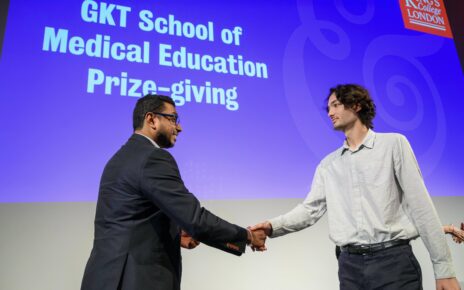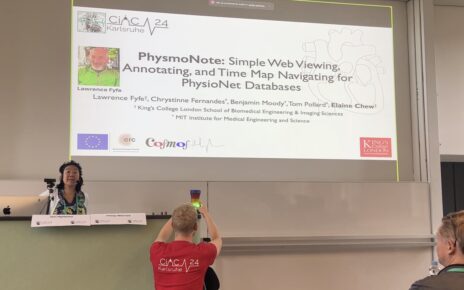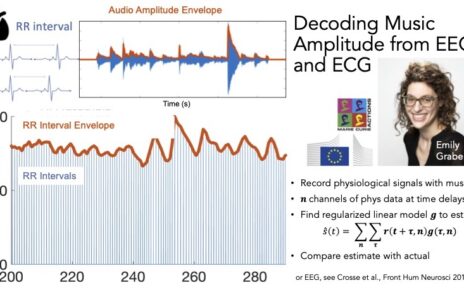Elaine Chew with colleagues Anja Volk (University of Utrecht) and Michael Casey (Dartmouth College) will give a tutorial on Music Information Retrieval (MIR) in health, medicine, and well-being applications at the flagship conference of the MIR community, the 26th International Society for Music Information Retrieval Conference (ISMIR), which will take place 21-25 September 2025 at the Korea Advanced Institute of Science and Technology (KAIST) in Daejeon, Korea.
MIR for Health, Medicine, and Well-being
Sunday, 21 September 2025, Afternoon (14:00-17:30 KST including break)
Presenters: Anja Volk, Elaine Chew, Michael A. Casey
Abstract:
This tutorial provides an overview of emerging opportunities to develop and employ methods from Music Information Research for music, health, medicine and wellbeing. Music-based interventions are gaining recognition as a fertile domain for research, alongside rapidly growing developments in music technology to support music’s affordances for health and well-being. We provide an overview and introduction for the MIR community to the potential contributions of computational methods to this field. The tutorial introduces examples of existing research and shows avenues for future directions, employing MIR’s rich tradition of computational analysis of musical structures in different health settings. The three parts of the tutorial provide an overview on the topics of:
(1) MIR for Music Therapy (e.g. technologies for analyzing musical structures from clinical improvisations; for generating music targeting specific therapeutic functions; for supporting music-based training in between therapy sessions at home) (2) MIR in Music Heart Theranostics (use of music in digital therapeutics and precision diagnostics for cardiovascular health and disease; data and software tools for music and cardiovascular signals); (3) Neurology and Music Information in Epilepsy Research (e.g. studying music & neurology in clinical settings; joint analysis of iEEG and music features; biomarkers of music processing in iEEG).
We reflect on the potential of MIR to support research into the effectiveness of music in the health context, employing computational analysis of musical, physiological, and behavioural data in researching underlying mechanisms of music interventions. The tutorial offers connections between established MIR topics (such as audio signal processing, symbolic music processing, pattern detection), and their applications in healthcare through interdisciplinary collaborations between MIR, music cognition, neuroscience, musicology, medicine, music therapy, and related fields. We keep the technical details at an introductory level and expect the tutorial to be suitable for established and new MIR researchers.
Biographies of the presenters:
Anja Volk is Professor of Music Information Computing at Utrecht University, her research aims at enhancing our understanding of music as a fundamental human trait while applying these insights for developing music technologies that offer new ways of interacting with music. Her research comprises a broad spectrum of research questions from theoretical to technology-related issues, engaging areas such as computational music analysis, computational musicology, mathematical music theory, music cognition, and music technology for health, wellbeing and inclusion. She is committed to connecting different research communities and providing interdisciplinary education for the next generation through the organization of international workshops, such as Lorentz Center in Leiden workshops on music similarity, computational ethnomusicology, and music, computing, and health. She has co-founded several international initiatives, most notably the International Society for Mathematics and Computation in Music (SMCM), the international WIMIR mentoring program, and the flagship journal of the International Society for Music Information Retrieval (TISMIR).
Elaine Chew is Professor of Engineering at King’s College London, with equal joint appointments in the Department of Engineering and School of Biomedical Engineering & Imaging Sciences. An operations researcher and pianist by training, Elaine is a pioneering researcher in MIR, focussing on mathematical representations and computational techniques for decoding musical structures. She is forging new paths at the intersection of music and cardiovascular science, applying MIR techniques to music-heart-brain interaction and computational arrhythmia research. She founded the Music Theranostics Lab at King’s, where she directs research on music-based digital therapeutics and precision diagnostics. Her research has been recognised by the ERC, PECASE, NSF CAREER, (Harvard) Radcliffe Institute for Advanced Study, and the Falling Walls Science Breakthrough 2023 (Art & Science) Award.
Michael Casey is the Francis and Mildred Sears Professor in Computer Science and Music at Dartmouth, USA. Fusing MIR, neuroimaging (fMRI, ECoG), and music theory, his research explores MIR-based methods (recommender and generative systems) to create listening programs for patients with neurological disorders. He is working with multiple hospitals (Dartmouth-Hitchcock and Amherst Medical Center) to create individualized music therapies for epilepsy patients implanted with responsive neurostimulation (RNS) devices–thereby enabling possibilities for synchronized brain data collection and neuro-responsive music therapy. Funding for his research has been awarded by the National Science Foundation (NSF), the Mellon Foundation, the National Endowment for the Humanities (NEH), the Neukom Institute for Computational Science, industry, and the Engineering and Physical Sciences Research Council (EPSRC, UK).




